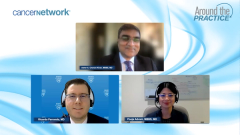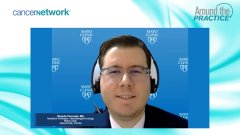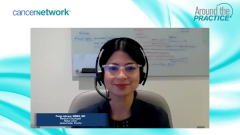
Firstline BTKi Monotherapy in Patients With CLL: 4-Year Follow-Up Data from ELEVATE-TN
Experts highlight that second-generation BTK inhibitors offer improved toxicity profiles, lower cardiovascular risks, and are well tolerated for long-term CLL treatment.
Episodes in this series

Asher A. Chanan-Khan, MD, MBBS: While we talk about zanubrutinib being the second-generation BTK [Bruton tyrosine kinase] inhibitor, the other available one also on the market that our audience has access to is acalabrutinib. One of the trials that comes to mind that I’ve been following for some years—and was very nicely reported recently by [Jeff] Sharman, [MD]—was a 4-year update on the ELEVATE TN trial [NCT02475681]. ELEVATE TN looked at acalabrutinib given in combination with obinutuzumab or as a monotherapy and then compared [with] obinutuzumab plus chlorambucil, which was considered standard therapy in these treatment-naïve patients. There were multiple end points, with progression-free survival [PFS] and overall survival [OS]. And we’ll talk more in terms of directing therapies in the clinic. The [PFS] at this time point was 48 months, [approximately] 84% for the combination vs 72% with acalabrutinib monotherapy. You can see the curves separating a little bit. The median [PFS] was not reached for either of the arms. This is in comparison [with] chlorambucil and obinutuzumab…where the PFS was 27 months. Now, the median OS was not reached for all of them, but for patients who [received] chlorambucil, there was a crossover into single acalabrutinib [monotherapy]. Whenever there’s a crossover, the answer becomes murky in terms of a good therapy, [such as a] BTK inhibitor. My take from the discussion on this aspect has been that the overall response to BTK inhibitors, irrespective of which one you pick—even first-generation ibrutinib—when we look at the responses in the first-line setting, you should expect 90% of patients to have some kind of a clinical benefit in terms of complete or partial remission and so forth. But there is an advantage that we are starting to see…. The toxicity profile has started to evolve better in favor of the second generation, especially with cardiac toxicity. A-fib [atrial fibrillation] is not a trivial [adverse] effect for a patient…. The last thing I gleaned from the discussion is that we are starting to see more and more complete remission [CR] and [complete remission with incomplete count recovery] with comparably low-intensity and low-toxicity therapies. Would you agree with summarizing this aspect?
Ricardo Parrondo, MD: Yes, I definitely agree. The second-generation BTK inhibitors have a better toxicity profile, not only in terms of cardiovascular toxicity but [also in] some of the other toxicities, such as diarrhea, myalgia, and arthralgia. Those appear to be less with the second-generation BTK inhibitors. Treatment is very well tolerated and [is] something that’s meant to be taken until disease progression or continuously. That’s ideal; you want a low toxicity profile so patients can continue to take it.
Transcript AI generated for clarity.
Newsletter
Stay up to date on recent advances in the multidisciplinary approach to cancer.










































